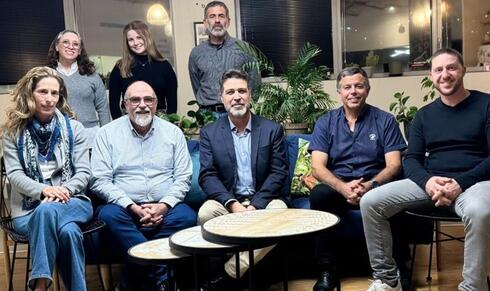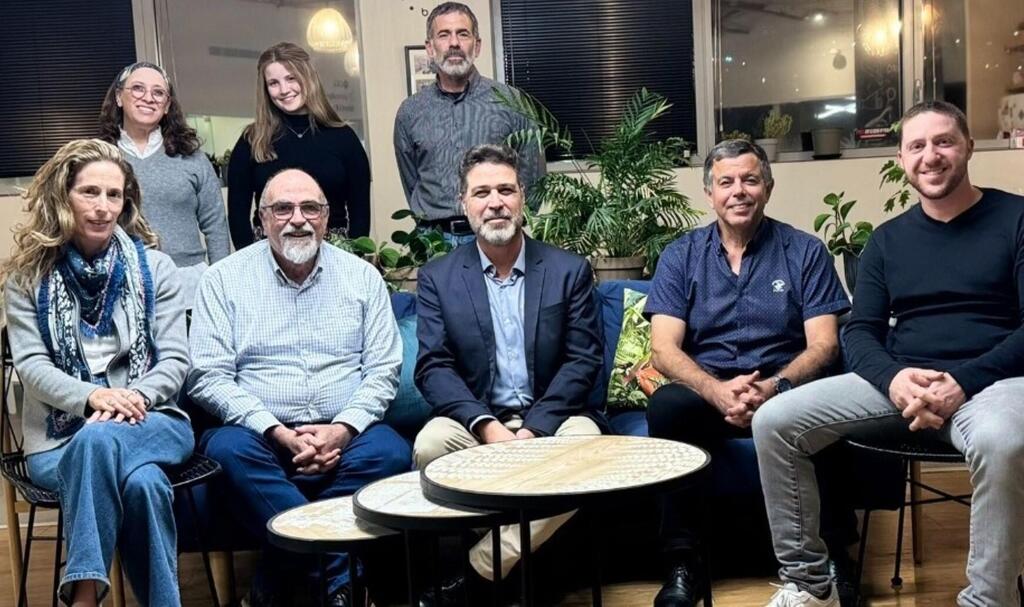
2025 VC Survey
eHealth Ventures bets big on vertical AI applications in 2025
The investment firm sees significant growth potential in tailored AI solutions for healthcare, despite global AI infrastructure challenges.
“Competing globally in building AI models requires massive investments and vast computing resources, which Israel lacks. However, not leading in infrastructure does not mean that Israel has missed the AI train,” said Ophir Shahaf and Talor Sax from eHealth Ventures. “Israeli companies are successfully implementing advanced AI models to create vertical AI solutions designed for specific industries, combining deep domain knowledge with AI capabilities.”
The pair joined CTech for its 2025 VC Survey to discuss the ecosystem, specifically how healthtech and AI will progress in the next year.
“These solutions are trained on industry-specific data, understand sector-specific terminology and regulations, and are optimized for tailored business processes. Israel will continue to lead vertical AI applications, transforming giant global industries,” they added.
You can read the entire interview below.
Fund ID
Name of fund/funds: eHealth Ventures
Total sum of the fund: $70M AUM
Partners and Team: Talor Sax, Dr. Yossi Rosenblum, Yossi Lovton, Adv. Orly Sternfeld, Ophir Shahaf, Rose Schwartz, Aryeh Stern, Tali Lipsyzc
Name of Participant: Ophir Shahaf, Talor Sax
Notable/select portfolio companies (active): EfA, Agamon, DreaMed, IdentifAI, Qlog, Fize Medical, YonaLink, Acculine Medical
Notable exits: Not yet
2024 is over. How can you summarize it in terms of the Israeli high-tech industry?
This was a tough year. Companies had a hard time raising money and investors were fewer. Of the companies that did succeed in raising capital, most did so from local funds as opposed to rounds raised from overseas funds in the past. The promising companies need to rely on current shareholders and focus on value appreciation and asset accumulation, before the next up-round as the cycle turns.
Looking ahead to 2025 - What challenges and opportunities await the Israeli high-tech sector in the coming year, and how are you, as investors, preparing for them?
Investors and companies are pushing towards foreign markets and investors (flip to non-Israeli companies). The goal of this push is connecting to strategic partners and other added-value investors while building and preparing the company for the next stage.
In dealing with the current situation, we have built an ecosystem to support our portfolio companies and companies within our sphere. In the past year, we have led initiatives to expand the activities in our ecosystem and we will continue to expand it in the coming year.
eHealth Ventures manages an incubator and two venture capital funds. The partnership specializes in Deep Health Tech and manages a complete ecosystem that includes investment and support in companies and provides entrepreneurs with an operational and financial envelope.
The partnership includes a fund for follow-on investments as well as a network of strategic partners who also provide financing at later stages, along with a connection to the market and additional customers. As part of the unique ecosystem that eHealth Ventures has built, a consortium of 20 international and local pharma and technology companies has been established that will participate alongside the fund's investments in the number of tens of millions of dollars.
Recently, eHealth Ventures, together with the Israel Medical Association, established Club D, an investor club through which 30,000 physicians who are members of the IHA will be able to invest in digital health startups for the first time.
How will new American leadership affect the global high-tech industry or economy? And where does this place Israel and its entrepreneurs?
Companies and investors here cannot change the assets accumulation and fundraising plans based on the US leadership. However, setting up a “foothold” in the US / Eur. through a subsidiary or a partnership is a great way for startups to mitigate the risks of policy changes towards Israel. This way, a company can continue with its plans and expansions independent of politics.
Israeli companies have acted this way in the past and will continue because it positions them close to their customer market. Israeli innovation brings real solutions to the market and meets existing needs, with a strong focus on bringing value to the market by solving real-world problems.
For example, our portfolio company YonaLink has developed a data collection and management platform for clinical trial sponsors, CROs, and hospitals, solving a real-world need for data accessibility among these players.
What are the three most important things the Israeli government should do today to accelerate the high-tech engine in the coming year?
Additional IIA grants, access to more strategic investor exposure here in IL (events, webinars, conferences), sending more companies to foreign multi-national forums.
One way the government can support access to IIA grants is through the incubator program. For the past 8 years, eHealth Ventures held a license to operate as a technological incubator under the IIA franchise. This license enabled us to invest in high-risk early-stage ventures with the assistance of some non-dilutive funding from the IIA, investments that typically would have been too risky for a traditional investor.
During the incubator period, we’ve invested in over 25 of these high-risk health tech companies. While 10 of these investments are still completing the incubator period, of the 15 companies who have graduated from the incubator over 80% have raised follow-on investment from additional investors. This is just one example of how increasing IIA accessibility to grants can infuse more into the high-tech engine.
Are there new sectors you see as relevant? Are there any fields you anticipate will weaken significantly in the coming year?
In HealthTech - we see software solutions for hospital management and efficacy taking a larger part of the investment pie, as well as constant growth in RPM products (Remote Patient Monitoring). We are looking at Mental health and longevity – as both are important and underserved markets with a lot of patients who would benefit greatly from proper care.
Despite the need on behalf of the patients, the models for commercialization that we have come across are not yet fully defined, it is unclear where the profitability in these services lies, and market entry is complicated by issues of privacy and effective scaling.
Entrepreneurs who are coming into these spaces need to have a clearly defined business plan, that includes special attention to who will be the payors and why will they be willing to pay for this product. Many times, we have seen startups with an interesting product, but they themselves are not confident in who will be willing to pay. You need to convince us as investors that your customers know what value they gain by using your product.
Is Israel missing out on the AI revolution in the global arms race? If not, what should the local industry focus on to join the global race?
Competing globally in building AI models requires massive investments and vast computing resources, which Israel lacks. However, not leading in infrastructure does not mean that Israel has missed the AI train. Israeli companies are successfully implementing advanced AI models to create vertical AI solutions designed for specific industries, combining deep domain knowledge with AI capabilities. These solutions are trained on industry-specific data, understand sector-specific terminology and regulations, and are optimized for tailored business processes. Israel will continue to lead vertical AI applications, transforming giant global industries.
Could the global IPO drought end in the coming year?
We do not have a crystal ball, but the changing administration in the US and hopefully stabilization in our region will lead to more investments. Investors with dry powder now should put it to work for companies with promising solutions where the valuations are more comfortable, because of the current crisis and negative sentiment.
From an investor's perspective: will the coming year be better for early-stage startups or more mature companies?
Early-stage companies will have a much harder time during this upcoming year. Following a significant change-up to the system by which the Israeli Innovation Authority will be awarding grants, investors will be wary of high-risk endeavors without the government support of the past before investing in a new venture.
This will direct us, and many other investors with dry powder – towards more advanced companies who have already hit the “typical” milestones of early-stage companies such as clinical validation and regulatory approvals, and are on track to begin the commercialization process.
Did you raise fund money in 2024 for an existing fund or a new one? What are your expectations regarding this matter for 2025?
We are setting the foundation for our new fund and will work on it in 2025. Probably via a multinational vehicle with some major strategic investors. We did not start discussions this year – with everything going on both a national and global level we did not feel it was the right time.
How many investments did you make in 2024, and how does it compare to previous years?
17 investments (8 pre-seed, 9 seed), which was our record year (!!) despite all the factors and challenges mentioned above.
Provide an example of an intriguing investment you made in 2024. What sets this company apart, or what is distinctive about its sector?
One intriguing investment our team made during 2024 was in DreaMed. DreaMed is a diabetes management solution. In a nutshell, their platform acquires patient data from dozens of disparate device platforms to create comprehensive and meaningful insights for patients and physicians.
What sets this company apart is who they are targeting as the main users of their product. Diabetes treatment is typically handled by endocrinologists, however with the growing number of diabetes patients many do not have proper access to these specialists. Their platform grants primary care physicians the tools to treat most cases of diabetes, effectively opening a new avenue of treatment for diabetic patients and channel of revenue for PCPs. Moreover, the CEO recently relocated to the US, allowing a much more intensive connection to the target market, strategic partners and potential customers.
Two notable companies that you think will thrive in 2025.
Company Name: EFA – Engineering for All
Sector + description of the product/service: The company developed a microscope-based hand-held point-of-care device at an ultra-low cost with superior accuracy. The initial application is Complete Blood Count via a finger prick. A single drop of blood is collected to a dedicated slide and the results are shown on the device screen.
Investment amount + total: Round of $ 2.2M, out of which eHV invested $ 0.7M
Founding Year: 2019
Reasoning why this is their year: After completing development and regulatory approval, as well as setting up a full manufacturing line, EFA is prepared to penetrate and accelerate sales in multiple markets. Every clinician knows the value and importance of CBC and there is zero market education around the use case of the technology. In the BRIC growth economies, the availability of clinical laboratories is limited and there is a huge demand for POC solutions.
Company Name: Acculine Medical
Sector + description of the product/service: Acculine has developed the CORA system, for early detection of Cardiac events, working with Mayo Clinic to introduce the product to the US market
Investment amount + total: The recent round was $ 4.3M, out of which eHealth Ventures invested $1M
Founding Year: 2021
Reasoning why this is their year: The product is working on advanced clinical validation (in Israel), a pre-marketing trial in the FDA, and regulatory approval is next - pre-entry to the market. The company is using the two novel biomarkers (Voltage Speed and VCG) in addition to the advanced signal processing capabilities to create a revolutionary 3-minute measurement of the heart’s activity - this is accurate, fast, and easy to use (any staff member) and can revolutionize cardiac care by providing early detection for one of the major killers today. This is a huge burden on the system that is looking for an effective solution.













